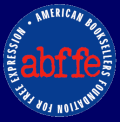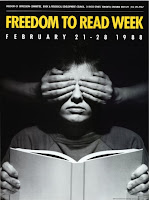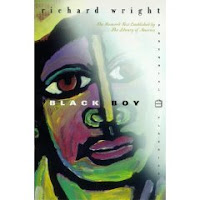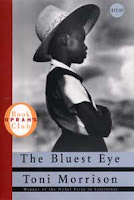Claudia from The Bottom of Heaven asked if I wanted to participate in Blogger's roundtable for Toni Morrison's The Bluest Eye, to celebrate its 40 anniversary. There was only one answer I could give YES.* First Happy Anniversary to the Bluest Eye. And thank you Claudia for asking me to participate.
The first time I read The Bluest Eye I was 13 or 14 yrs old. I feel very lucky to have discovered Morrison so early. I missed Mildred Taylor, the same thing could've easily happened with Morrison. The Bluest Eye wasn't school reading, though I do recall my 9th grade English teacher, giving me a list of authors right before the beginning of summer. I am pretty sure Morrison's name was on the list. At the time I was reading a lot of genre fiction books by Stephen King or Silence of the Lambs by Thomas Harris. I was just discovering Black authors. Sure I read James Baldwin, Richard Wright even Donald Goines, but it was the ladies who had me.
Of course alot of The Bluest Eye, was over my head the first time I read it. Though that didn't matter since Morrison's characters and language felt familiar.
Forty years later I will always be thankful for Morrison's first novel. The Bluest Eye opened literary doors for many Black female authors.
Without it I may never of had the chance to read Tina McElroy Ansa, Toni Cade Bambara, Gaylor Naylor, Ntozake Shange, Alice Walker and all the other Black female authors whose stories speak to me like genre fiction never will. There were a few topics, we could've tackled for this roundtable. I choose - Humanizing Cholly Breedlove: Vilified? Redeemed? How did you respond to this character or how might we read him today?
There were a few topics, we could've tackled for this roundtable. I choose - Humanizing Cholly Breedlove: Vilified? Redeemed? How did you respond to this character or how might we read him today?
The first time through Cholly Breedlove was evil. Any man who would hit his wife, set his house of fire and rape is daughter couldn't be anything but evil. Years later when I reread The Bluest Eye, I payed closer attention and noticed there was more to Cholly. I felt compassion towards him.
This was the first time I had to reevaluate my perception towards a particular character after rereading a novel. So I decided to take an even closer look at Cholly.
Cholly Breedlove is Pecola's father. Pecola is the little girl who dreams and wishes for blue eyes. With blue eyes Pecola believes she will be beautiful and loved. Breedlove's are poor and ugly. One is bad but both is unforgivable.
Before Cholly becomes half of a marriage that thrives on conflict, he is a man with potential. Cholly almost lost his chance at being anything. When he was four years old his mother placed him on a junk railroad. He was saved by his great aunt Jimmy.
Cholly's aunt raised him until he was 14yrs old. When she's dies, Cholly ran away to find his father. His aunt took care of him but there was no love. Cholly's went searching for a male roll model and someone to love him.
9 Comments on The Bluest Eye - Happy Anniversary, last added: 7/2/2010
Viewing: Blog Posts Tagged with: The Bluest Eye, Most Recent at Top [Help]
Results 1 - 4 of 4
Blog: Color Online (Login to Add to MyJacketFlap)
JacketFlap tags: The Bluest Eye, anniversary, Doret, Add a tag
Blog: Fahrenheit 451: Banned Books (Login to Add to MyJacketFlap)
JacketFlap tags: US, The Bluest Eye, Slaughterhouse-Five, American Booksellers Association, Running with Scissors, The Freedom Writers, banned book week, Add a tag
This is Banned Book Week in the U.S. Novel Journey presents an interview with Rebecca Zeidel, Program Director for American Booksellers Foundation for Free Expression. The web log is part of Christian Women Online.
Novel Journey presents an interview with Rebecca Zeidel, Program Director for American Booksellers Foundation for Free Expression. The web log is part of Christian Women Online.
Zeidel responds to the following questions:
What is Banned Book Week?
What is the goal of Banned Book Week?
What percentage of books are challenged or banned because of moral content? Political content? Racial content? Violence? Other (please explain)?
Who suffers the most if a book is challenged?
How can novelists support Banned Book Week?
Which states or regions are more likely to jump on the banning band wagon?
Zeidel identifies the Howell, MI banning of 5 titles in a response to this question: What is the most appalling situation you've seen or heard of regarding a challenged book?
In February, five books were challenged in Howell, MI for sexual themes and profanity: Black Boy by Richard Wright, Running with Scissors by Augusten Burroughs, The Bluest Eye by Toni Morrison, Slaughterhouse Five by Kurt Vonnegut, and The Freedom Writers Diary by Erin Gruwell. The books were challenged in Howell High School in by members of the Livingston Organization for Values in Education (LOVE) with assistance from the Michigan chapter of the American Family Association.
According to its web site,
The American Family Association represents and stands for traditional family values, focusing primarily on the influence of television and other media – including pornography – on our society.
Of great interest, since a number of challenges come from the religious sector is Zeidel's answer to this question: "How can novelists who write from a JudeoChristian worldview support free speech?"
Blog: Fahrenheit 451: Banned Books (Login to Add to MyJacketFlap)
JacketFlap tags: Katherine Paterson, Freedom Writers, Bridge to Terabithia, The Bluest Eye, Toni Morrison, Susan Patron, The Higher Power of Lucky, suicide, Erin Gruwell, Add a tag

Take the Banned Book Challenge!
Freedom to Read Poster 1988
The NY Times reports that a Newbery-award winning book is facing widespread banning from school libraries because of one word.
Speaking of Newberys, Bridge to Terabithia opened this weekend. Read an interview about censorship with author Katherine Paterson.
The Daily Press & Argus reports that the Howell Board of Education voted 5-2 to allow teachers to assign The Freedom Writers Diary, Black Boy, and The Bluest Eye to advanced English classes. School Board member Wendy Day who voted for the ban states she has filed a form to ask for an official review of the Morrison book.
Update: The Conservative Media Blog reports that banners are still "howelling" in Howell, MI. The Daily Press and Argus reports that some parents are taking the battle to the courts, claiming that books on the curriculum break pornography laws. Stay tuned. It isn't over yet.
Librarian Kathryn Greenhill, the Australian blogger of Librarians Matter mulls over the pros and cons of having a book in a university library that tells one how to kill oneself.
Blog: Fahrenheit 451: Banned Books (Login to Add to MyJacketFlap)
JacketFlap tags: school board, banning, Black Boy, The Bluest Eye, Richard Wright, Toni Morrison, Add a tag
Two more books are being challenged by parents of Howell Public High School students. In this entry and this entry, there is information about The Freedom Writers Diary which faced a challenge from parents and a community group called "LOVE" (Livingston Organization for Values in Education) because of profanity. Today the Daily Press and Argus reports that Black Boy by Richard Wright and The Bluest Eye by Toni Morrison which are both taught in Grade 11 may be removed from the curriculum because of graphic sexual content and profanity. A decision as to whether they would left in the classroom was delayed because the school board did not have the necessary number of votes to either approve or table the curriculum. The two books have been on the curriculum for years but a change from semesters to year-long classes opened the opportunity for debate on the books being used.
The newspaper reports that the majority of the speakers were in favor of allowing the continued use of the books and that they were loudly applauded by the crowd of about 150 people. The curriculum was approved by a group of teachers from the particular school, a district-wide subject-specific content committee, a district-wide curriculum and assessment committee, among others, before being presented to the school board.
The curriculum was approved by the school board with voting on the books themselves to be voted on at the February meeting. The The Merriam-Webster Encylopedia of Literature describes Black Boy as follows:
The The Merriam-Webster Encylopedia of Literature describes Black Boy as follows:
Autobiography by Richard Wright, published in 1945 and considered to be one of his finest works. The book is sometimes considered a fictionalized autobiography or an autobiographical novel because of its use of novelistic techniques. Black Boy describes vividly Wright's often harsh, hardscrabble boyhood and youth in rural Mississippi and in Memphis, Tenn. When the work was first published, many white critics viewed Black Boy primarily as an attack on racist Southern white society. From the 1960s the work came to be understood as the story of Wright's coming of age and development as a writer whose race, though a primary component of his life, was but one of many that formed him as an artist.
 Random House describes the book as follows:
Random House describes the book as follows:The Bluest Eye, published in 1970, is the first novel written by Toni Morrison, winner of the 1993 Nobel Prize in Literature.
It is the story of eleven-year-old Pecola Breedlove--a black girl in an America whose love for its blond, blue-eyed children can devastate all others--who prays for her eyes to turn blue: so that she will be beautiful, so that people will look at her, so that her world will be different. This is the story of the nightmare at the heart of her yearning and the tragedy of its fulfillment.
February 5, 2007
"Communications Guru," editor of Conservative Media weighs in on challenges in Howell, MI, his community.The Conservative Media: School district appears to be caving to book burners



I'm so thrilled for this forum on TBE. It is exciting for me to be finding new blogs to read and to discuss the issues of the book in a meaningful manner.
Cholly is a character worth a great deal of discussion. When I think of him, I think of that couch... a metaphor like so many others in that book. Something with promise and a symbol of pride and hardwork becomes damaged -- and isn't quite right afterward. But beyond that, it becomes a symbol of things that went wrong. Things that are reminders of pain and frustration.
I think that is what Pecola becomes. A reminder that Cholly isn't -- that he can't be -- what he once believed he could be. (Which is to say, I agree very much with what you've written!) Writing him so sympathetically is, I think, very important to this story. The threat and fear of 'the black man' is so pervasive and negative, she had to deal with this in a very real way -- he had to be broken, too, he had to have a heart. This doesn't make him forgivable, but it makes him more understandable.
Great post, Doret. Morrison's decision to give Cholly a life and a backstory was really disturbing to me at first too. I'm still a little troubled by the way Morrison puts us inside his head during the rape scene while still leaving so much doubt as to what what he and Pecola were experiencing. I think this ambiguity makes his actions all the more chilling. But Morrison achieves in making every character - with the exception, maybe, of Maureen Peal - complex and multi-dimensional. It takes a very good writer to pull something like that off!
@coldspaghetti - I hadn't thought of the couch as a comparison; that works really well!
Finding compassion for Cholly is a challenge for me and a tribute to Morrison's brilliance as a writer.
This blog post reminded me of a recent post by author Tayari Jones about finding empathy for the characters in her writing. She said:
"One thing I like to do is to write journal entries in the voices of other people, or even characters in my books......The challenge is that you have to discover something new about the person or character. If your exercise reveals only what you came to the page with in the first place, then you have not tapped into the empathy you are going to need to write the story you want to write. The thing is that you are really going to have to want to understand that person, which means you may have to let go of that anger."
I would love to know how Morrison was able to let go of her anger when thinking about Cholly and see him as human.
Tayari's full post is here:
http://www.tayarijones.com/blog/archives/2010/04/on_writing_with.html
Thanks everyone for commenting in spite of the posting glich. I believed I fixed it.
coldspaghetti- I loved the couch metaphor. And like Claudia, I missed the comparrison with Pecola.
But now that you part it out its seems so clear. Pecola's supposed lack of pretty was one more reason for the Breedlove parents to give in.
I couldn't forgive Cholly for the rape but it was hard to hate him when I knew the reason behind his violence.
Claudia - Maureen Peal didn't stay long but I think she served her purpose. Though now I do wonder why was she nice to Pecola that one time.
Was it because she was pretty and she could afford to be? Or was she simply a nice person. It was very hard to get a read on Maureen's personility with the young narrator.
Though I would like to think it was because Maureen was nice since she did try to engage the young narrator, Claudia in conversations near their lockers.
Wdjenkins - I agree what Morrison did with Cholly took some serious skill. A female author writing Cholly this way, had to be a risk.
If the Bluest Eye was written now I wonder if the editors would ask Morrison to not make Cholly such an empathic character.
Doret, thank you for this wonderful post and for the new light (new for me) you shed on Cholly.
I'm still not healed from the mark the character left on me. I'm not sure one can read Morrison's books without being touched and/or scarred in some ways (not saying this with a negative connotation).
I read this book when I was way too young. In 5th grade. It definitely left an impact on me. I should reread so I can more actively participate!
I do remember finding it impossible to forgive Cholly and I was disturbed that we were in his head during the rape scene. But reading this post, does make me feel for him. I felt bad that he had such a tough childhood (don't remember the white men scene though) and it does become clear that he is frustrated with his lack of ability to give his family what they need.
Good discussion, thanks for posting!